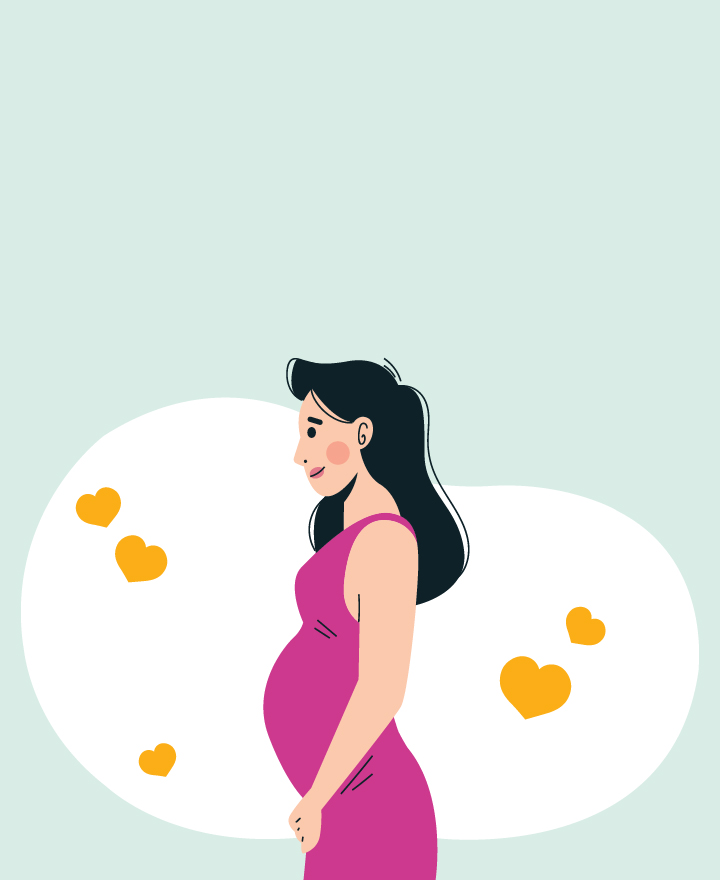

2nd Trimester Pregnancy: What to Expect
The second trimester of pregnancy is often the most enjoyable and it brings a renewed sense of well-being. Read on to find out how to relieve the common symptoms experienced during this phase and consider ways to prepare for what's ahead.
What Is the Second Trimester?
The second trimester of pregnancy includes weeks 13 through 27 of a pregnancy. Most women find second trimester a lot easier than the first. This phase marks a turning point for the mother and foetus as the baby grows larger and stronger and many women begin showing a larger belly.
What Happens to A Woman’s Body?
The changes experienced in the second trimester can be attributed to a decrease in levels of human chorionic gonadotropin hormone and an adjustment to the levels of estrogen and progesterone hormones.
The following is a list of changes and symptoms that may happen during the second trimester:
• Growing belly and breasts:
As uterus expands to accommodate the baby, your belly grows. Also, your breasts will gradually increase in size.
• Quickening:
You may be able to feel the movement of the fetus for the first time around 20 weeks.
• Braxton Hicks contraction:
These are mild, irregular contractions which you might feel as slight tightness in your abdomen. They’re more likely to occur in the afternoon or evening. If the contractions become regular and steadily increase in strength, then contact your doctor as this could be a sign of preterm labour.
• Skin Changes:
Hormonal changes during pregnancy stimulate an increase in pigment-bearing cells in your skin. As a result, you might notice brown patches on your face.
• Nasal Problems:
Hormonal changes can cause mucous membranes to swell and bleed easily, resulting in stuffiness and nosebleeds.
• Leg Cramps:
Experiencing leg cramps is common as the pregnancy progresses.
• Dizziness:
Changes in circulation caused during pregnancy might leave you dizzy.
• Dental issues:
Pregnancy can cause your gums to become more sensitive to flossing and brushing, resulting in minor bleeding.
• Vaginal discharge:
It is normal to notice a sticky, clear or white vaginal discharge.
• Urinary Tract Infections:
These infections are common during pregnancy.
What Happens to The Foetus?
• The baby’s organs become fully developed during the second trimester.
• The baby can also start to hear and swallow.
• Small hairs become noticeable.
• The placenta is fully developed.
• The baby kicks, moves and can turn from side to side
• The baby goes through the cycles of sleep and wakefulness.
• The brain undergoes its most important period of growth from 5th month on
• Fingerprints and toe-prints are formed
• Rapid growth continues in baby’s size and weight
What Can Be Expected at The Doctor?
You should see your doctor about every two to four weeks during the second trimester of pregnancy for a regular check-up. Depending on your condition, the doctor may perform the following tests during a visit –
1. Measuring your blood pressure
2. Assessing your weight
3. Ultrasound
4. Diabetes screening
5. Birth defect and other screening tests
6. Amniocentesis
How Can You Stay Healthy During the Second Trimester?
It is important to take care of your health so as to ensure proper development of your baby. Make sure to eat a healthy and balanced diet, exercise regularly, drink lots of water, continue to take prenatal vitamins, and eat enough calories.
Complications
There are few complications that a woman might experience in second trimester. This includes:
1. Bleeding
2. Preterm Labour
3. Preterm Premature rupture of Membranes, also referred as ‘Water Breaking’
4. Cervical insufficiency
5. Preeclampsia
Conclusion
The second trimester of pregnancy is a fun and enjoyable phase where you can feel your baby grow. Stay healthy and cherish every moment while you inch closer to your delivery date.
Sources: Healthline, Mayo Clinic, Cleveland Clinic
Disclaimer: This blog provides general information and discussions about health and related subjects. The information and other content provided in this blog, website or in any linked materials are not intended and should not be considered, or used as a substitute for, medical advice, diagnosis or treatment. Kindly contact your Doctor before starting a new medicine or health regime.
Related Articles
How To Stay Healthy During Pregnancy
15 Foods To Cure Your Morning Sickness And Nausea While Pregnant
Nutrient-Rich Foods For A Healthy Pregnancy
10 Best Movies You Should Watch When You’re Pregnant
How Stretching Exercises Can Benefit During Pregnancy
Published on October 03, 2022

















 Health Insurance
Health Insurance  Travel Insurance
Travel Insurance  Car Insurance
Car Insurance  Cyber Insurance
Cyber Insurance  Critical Illness Insurance
Critical Illness Insurance
 Pet Insurance
Pet Insurance
 Bike/Two Wheeler Insurance
Bike/Two Wheeler Insurance  Home Insurance
Home Insurance  Third Party Vehicle Ins.
Third Party Vehicle Ins.  Tractor Insurance
Tractor Insurance  Goods Carrying Vehicle Ins.
Goods Carrying Vehicle Ins.  Passenger Carrying Vehicle Ins.
Passenger Carrying Vehicle Ins.  Compulsory Personal Accident Insurance
Compulsory Personal Accident Insurance  Travel Insurance
Travel Insurance  Rural
Rural